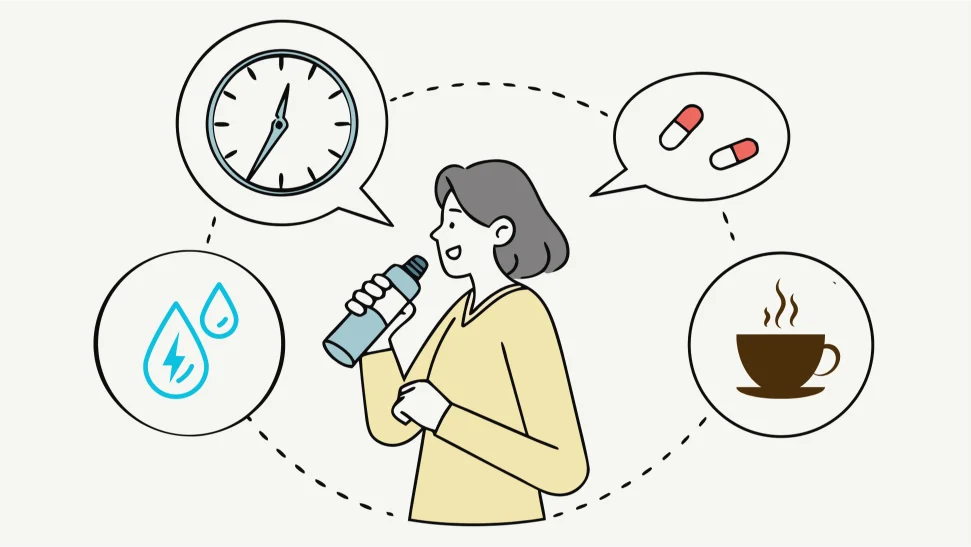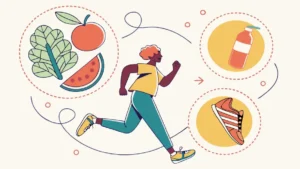Mastering Intermittent Fasting with the Right Supplement
Intermittent fasting has become one of the most popular wellness trends, with millions discovering its benefits for weight loss, better energy, and improved health. But here’s the big question everyone asks: what intermittent fasting supplements can you actually take without ruining your fast?
This guide cuts through the confusion with clear, science-backed answers. Whether you’re just starting with 16:8 fasting ideas or looking for the best protein shake for intermittent fasting, we’ve got you covered.
You’ll learn exactly which supplements support your fasting goals, which ones to avoid, and how to create a routine that maximizes your results. Let’s dive in and make your fasting journey both effective and sustainable.
What Actually Breaks Your Fast? The Science Made Simple
Understanding what breaks a fast is crucial for success. When you fast, your body undergoes amazing changes – blood sugar drops, insulin levels fall, and your body switches from burning sugar to burning fat for energy.
Here’s what definitely breaks your fast:
- Any calories – Even small amounts signal your body to stop fat-burning
- Sugar and artificial sweeteners – These spike insulin immediately
- Most protein powders – They contain calories and amino acids that trigger insulin
The key player here is insulin. When insulin rises, all the good stuff happening during your fast (fat burning, cellular repair, autophagy) comes to a screeching halt.
But don’t worry – plenty of helpful supplements won’t interfere with these benefits.
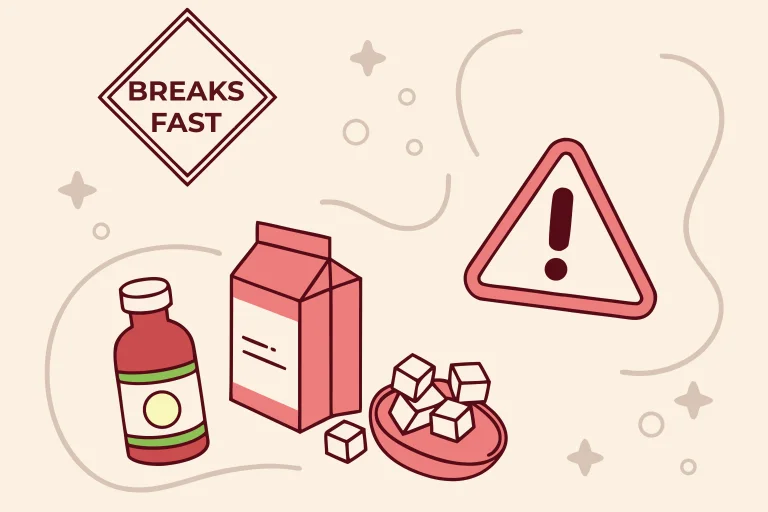
Safe Intermittent Fasting Supplements That Won’t Break Your Fast
Electrolytes: Your Fasting Foundation
Electrolytes are absolutely essential during fasting, especially for beginners trying 16:8 fasting ideas. When you fast, your body loses these vital minerals faster than usual, which can leave you feeling tired, headachy, or just plain awful.
Why electrolytes matter:
- Prevent the dreaded “fasting flu” symptoms
- Keep your energy stable throughout the day
- Support proper hydration at the cellular level
- Zero calories means your fast stays intact
Focus on these key electrolytes:
- Sodium – Lost quickly during fasting, essential for blood pressure
- Potassium – Prevents muscle cramps and supports heart function
- Magnesium – Helps with energy production and muscle relaxation
Pro tip: Choose unflavored electrolyte supplements without added sugars or artificial ingredients.
For sustained energy during your fasting window, consider reading about natural electrolytes for energy to understand how proper mineral balance supports your body’s energy systems.
Black Coffee and Plain Tea: Your Fasting-Friendly Energy Boost
Good news for coffee lovers! Black coffee and plain tea are perfect supplements during fasting that actually help your results.
Benefits include:
- Natural appetite suppression (thanks, caffeine!)
- Increased energy without breaking your fast
- Powerful antioxidants that support overall health
- Zero calories when consumed plain
The golden rule: Keep them plain. No milk, cream, sugar, or sweeteners that could trigger insulin.
Water-Soluble Vitamins: Easy Absorption
These vitamins dissolve in water and don’t need food for absorption, making them ideal for your fasting window:
- Vitamin C – Supports immune function and tissue repair
- B-Complex vitamins (B1, B2, B3, B5, B6, B7, B9, B12) – Essential for energy metabolism
These typically contain zero calories and can actually help maintain your energy levels during fasting periods.
L-Theanine: For Focus and Calm
This amino acid, naturally found in tea, promotes relaxation without drowsiness. It’s particularly helpful for managing any stress or anxiety that might come with starting a new eating pattern.
L-theanine benefits:
- Supports mental clarity and focus
- Helps manage fasting-related stress
- No insulin response when taken appropriately
- Promotes calm alertness
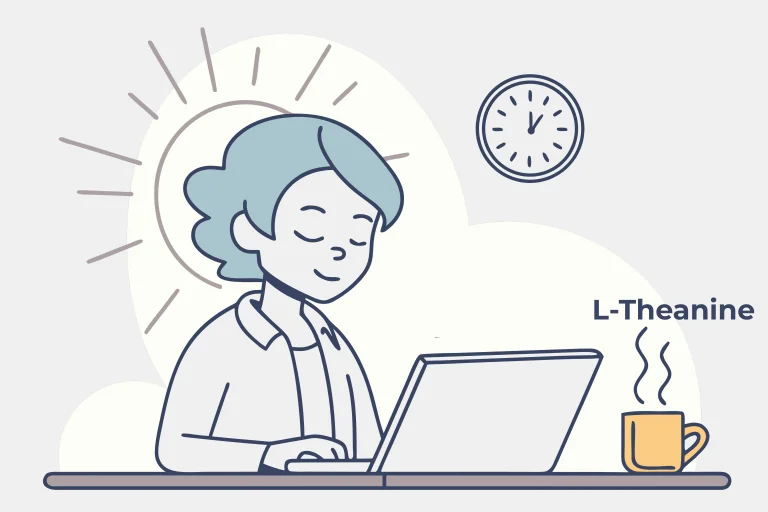
Creatine: Perfect for Fasted Workouts
If you exercise during your fasting window, creatine is a game-changer. It’s completely calorie-free and doesn’t affect insulin, making it safe for fasting.
Why creatine works for fasters:
- Provides immediate energy for high-intensity exercise
- Supports strength and power during fasted workouts
- May enhance brain function and memory
- Zero impact on your fasted state
Timing tip: Take creatine before or after your fasted workout for best results.
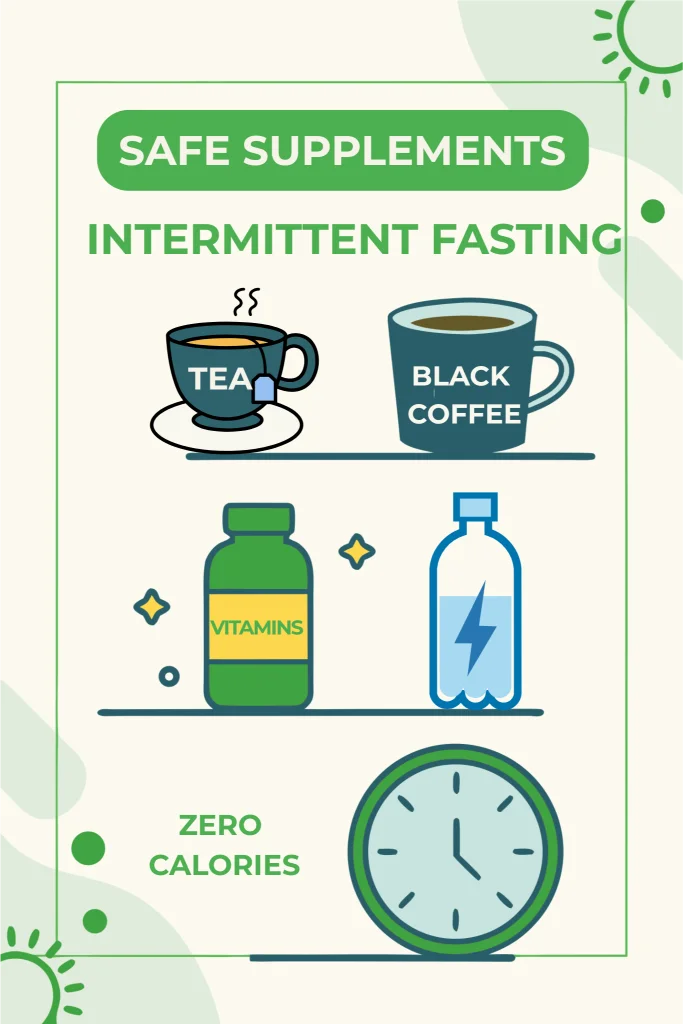
The Gray Area: Supplements to Use with Caution
Some supplements exist in a tricky middle ground – they might technically break a fast but could still be useful depending on your specific goals.
MCT Oil and Collagen: Strategic Use Only
MCT Oil contains about 121 calories per tablespoon, so it technically breaks a fast. However, it has some unique properties:
- Minimal insulin response
- Quickly converted to ketones for brain fuel
- May help extend fasting periods by reducing cravings
Pure Collagen faces similar considerations – it contains protein that will technically break your fast, but some people show minimal blood sugar response.
Bottom line: Use these strategically and sparingly (1 teaspoon or less) if they help you maintain longer fasts, but avoid them if weight loss is your primary goal.
BCAAs: The Ongoing Debate
Branched-Chain Amino Acids spark heated discussions in the fasting community. Here’s both sides:
Against BCAAs:
- Trigger insulin release
- Contain protein calories
- May disrupt autophagy
For strategic use:
- Help preserve muscle during extended fasts
- Beneficial for fasted exercise
- Metabolized directly in muscle tissue
The verdict: Most experts agree BCAAs can be helpful if you exercise during fasting, but skip them if autophagy is your main goal.
Best Supplements for Your Eating Window
Your eating window is prime time for supplements that need food for absorption or contain calories.
Protein Shakes: Muscle Support and Satiety
Finding the best protein shake for intermittent fasting depends on your specific needs, but protein during your eating window offers incredible benefits:
Why protein matters:
- Preserves muscle mass during weight loss
- Increases satiety, making your next fast easier
- Stabilizes blood sugar levels
- Has a thermogenic effect, boosting metabolism
Top protein options:
Whey Protein:
- Fast absorption for post-workout recovery
- Complete amino acid profile
- High biological value
- Generally cost-effective ($25-40 for 2 pounds)
Plant-Based Proteins:
- Easier on sensitive stomachs
- Vegan-friendly options
- Often combined with fiber for lasting fullness
- Variety of sources (pea, hemp, rice, mixed)
Casein Protein:
- Slow digestion provides steady amino acids
- Ideal for evening consumption
- Supports overnight muscle repair
Collagen Protein:
- Joint and skin support benefits
- Easy to digest and mix
- Versatile for various beverages
Fat-Soluble Vitamins: Absorption Optimization
Vitamins A, D, E, and K need dietary fat for proper absorption, making your eating window perfect for these supplements.
Key benefits:
- Vitamin A – Vision, immune function, skin health
- Vitamin D – Bone health, immune function, mood
- Vitamin E – Powerful antioxidant protection
- Vitamin K – Blood clotting, bone metabolism
Absorption tips:
- Take with meals containing healthy fats
- Space throughout your eating window
- Never take during fasting periods
Omega-3 Fatty Acids: Anti-Inflammatory Powerhouse
Omega-3s are best taken during eating windows and offer multiple benefits for intermittent fasters:
Benefits include:
- Reduced inflammation throughout the body
- Enhanced heart and brain health
- Support for fat metabolism
- Muscle preservation during weight loss
Timing recommendations:
- Take with meals for best absorption
- Ideal post-workout if you exercise before breaking your fast
- Combine with fat-containing meals to reduce any fishy aftertaste
If you’re looking to optimize your overall energy levels, you might also be interested in learning about foods that naturally increase energy to complement your supplement routine.
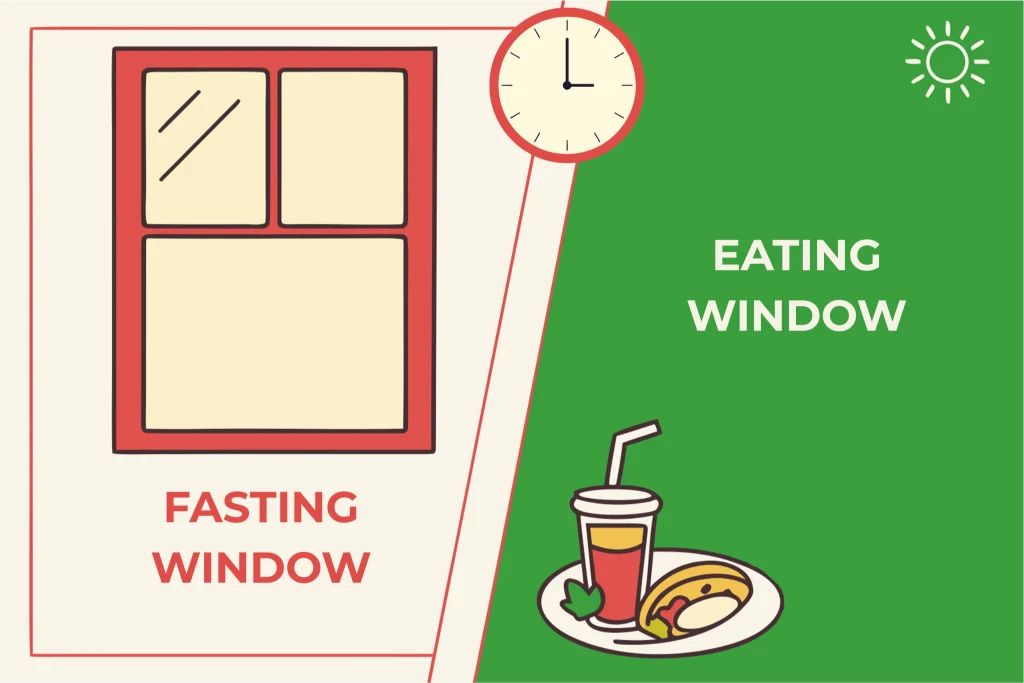
How to Start 16:8 Intermittent Fasting: A Beginner’s Guide
The 16:8 method is the most popular and beginner-friendly approach. You fast for 16 hours and eat during an 8-hour window each day.
Step 1: Choose Your Eating Window
The beauty of 16:8 lies in its flexibility. Popular 16:8 fasting ideas include:
12 PM – 8 PM (Most Popular):
- Skip breakfast, eat lunch and dinner
- Sleep through most of the morning fast
- Social dinner plans still work
10 AM – 6 PM (Early Finisher):
- Light breakfast or brunch
- Early dinner by 6 PM
- Great for early risers
2 PM – 10 PM (Night Owl):
- Perfect for late sleepers
- Accommodates late dinners
- Works well for social schedules
Step 2: Start Gradually
Don’t jump straight into 16 hours. Begin with a 12-hour fast (7 PM to 7 AM) and gradually extend by 1-2 hours each week until you reach 16 hours.
Step 3: Stay Hydrated and Supplemented
During your fasting window:
- Drink plenty of water
- Add electrolyte supplements
- Enjoy black coffee or plain tea
- Take your water-soluble vitamins
Step 4: Plan Your First Meal
Break your fast gently with nutrient-dense foods. Focus on protein, healthy fats, and vegetables rather than processed foods that might cause energy crashes.
Step 5: Listen to Your Body
Some initial hunger, fatigue, or irritability is normal as your body adapts. These symptoms typically improve within 1-2 weeks.
For additional support in maintaining steady energy throughout your fasting journey, consider reading about quick energy fixes for natural ways to support your energy levels.
What to Fast: Smart Food Choices for Your Eating Window
What you eat during your eating window is just as important as when you eat. Focus on nutrient-dense, whole foods that support your goals and keep you satisfied.
Sample Daily Meal Plan
First Meal (12 PM):
- Grilled salmon with quinoa and roasted vegetables
- Mixed greens salad with avocado and olive oil
- Fresh berries for antioxidants
Afternoon Snack (3 PM – Optional):
- Greek yogurt with nuts and seeds
- OR apple slices with almond butter
Dinner (6:30 PM):
- Lean protein (chicken, fish, tofu, or legumes)
- Complex carbohydrates (sweet potato, brown rice)
- Plenty of vegetables (steamed broccoli, sautéed spinach)
- Healthy fats (olive oil, nuts, avocado)
Key Nutritional Principles
Prioritize Protein: Aim for 25-30 grams per meal to support muscle maintenance and satiety.
Include Healthy Fats: Omega-3 rich foods, nuts, seeds, and olive oil support hormone production.
Choose Complex Carbs: Whole grains, legumes, and starchy vegetables provide sustained energy.
Maximize Vegetables: Fill half your plate with non-starchy vegetables for vitamins, minerals, and fiber.
Stay Hydrated: Continue drinking water throughout your eating window and consider herbal teas between meals.
Understanding how nutrition affects your energy can help optimize your eating window choices. Learn more about blood sugar and energy levels to make informed decisions about your meal timing and composition.
Frequently Asked Questions
Can I take gummy vitamins during my fast?
No, gummy vitamins will break your fast. Most contain 2-8 grams of sugar per serving, plus additional calories. This sugar triggers an insulin response and exits you from the fasted state. Choose capsules or tablets without added sugars, or save gummy vitamins for your eating window.
Will my medication break a fast?
It depends on the specific medication. Fasting-friendly medications typically include most antibiotics (pill form), blood pressure medications, and thyroid medications. Medications that may break a fast include cough syrups (often contain sugar), chewable medications, and liquid medications with sweeteners.
Important: Never stop taking prescribed medications without consulting your healthcare provider. Discuss timing options with your doctor if you’re concerned.
Can I drink alcohol while intermittent fasting?
It depends on timing and quantity. Alcohol breaks a fast and may affect blood sugar, hydration, and sleep. Read our full guide here.
How do I know if a supplement has hidden sugars?
Always check the supplement facts label for:
- Calories per serving – Any calories indicate potential fast-breaking ingredients
- Carbohydrate content – Even small amounts may impact fasting
- Ingredient red flags: Maltodextrin, dextrose, fructose, corn syrup, fruit juice concentrate, cane sugar, sucrose
Pro tip: Choose supplements specifically labeled as “fasting-friendly” or those with zero calories and minimal ingredients.
Your Path to Successful Intermittent Fasting
Navigating intermittent fasting supplements doesn’t have to be complicated. Here are your key takeaways:
Safe during fasting: Electrolytes, black coffee/tea, water-soluble vitamins, L-theanine, and creatine enhance your fasting experience without breaking your fast.
Use strategically: MCT oil, pure collagen, and BCAAs may technically break a fast but could support specific goals when used minimally.
Save for eating windows: The best protein shake for intermittent fasting, fat-soluble vitamins, omega-3s, and probiotics work best with food.
Start simple: Begin with proven 16:8 fasting ideas, choose an eating window that fits your lifestyle, and focus on nutrient-dense whole foods.
Quality matters: Read labels carefully, avoid hidden sugars, and choose reputable supplement brands.
Remember, intermittent fasting is a powerful tool for health optimization, but it’s most effective when combined with proper supplementation and mindful eating.
Start where you are, stay consistent, and give your body time to adapt. With the right approach to both fasting and supplements during fasting, you’ll be well on your way to achieving your health and wellness goals.
Whether you’re exploring what to fast or perfecting your supplement routine, the key is finding what works for your unique lifestyle and sticking with it. Your future self will thank you for taking this important step toward better health.


